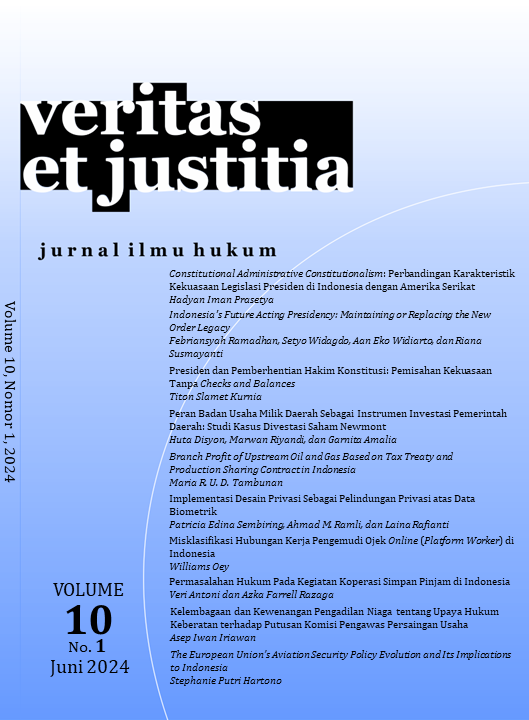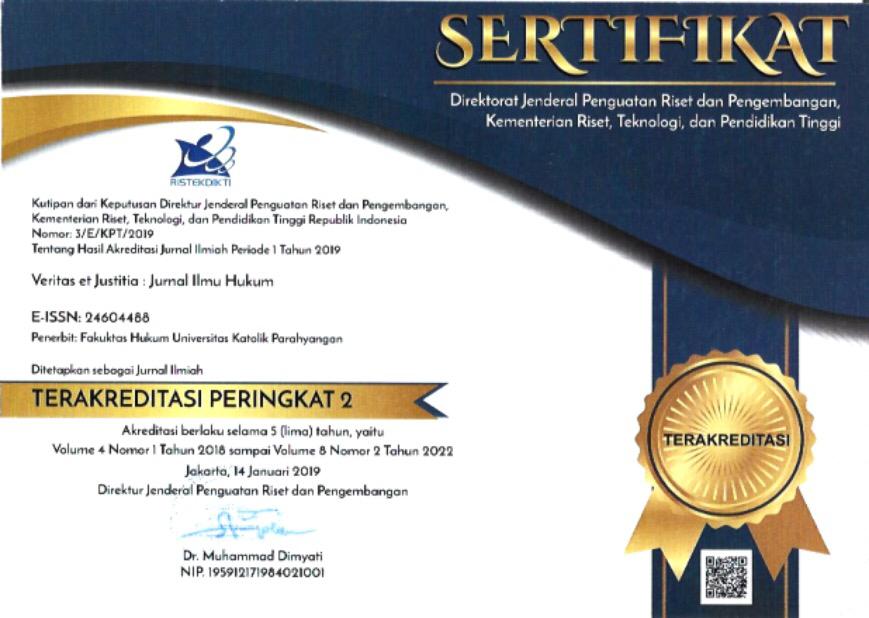MISKLASIFIKASI HUBUNGAN KERJA PENGEMUDI OJEK ONLINE (PLATFORM WORKER) DI INDONESIA
DOI:
https://doi.org/10.25123/vej.v10i1.7722Keywords:
employment relationship; partnership agreement; online riders; platform workerAbstract
Technological developments through digital platforms have created a new work ecosystem, allowing platform workers, such as online motorcycle drivers in Indonesia, to affiliate with various companies to provide transportation services. However, despite these advances, online riders have not received adequate rights protection as ‘workers’ because their status is limited to ‘partners’ (independent contractors) under the Partnership Agreement they sign. This article uses a normative approach to examine how legal developments in Indonesia can classify and protect online riders as workers under employment laws. A comparative approach is employed, referencing policies in Europe, particularly Spain and the European Union, which have been more progressive in interpreting employment relationships for platform workers. The research finds that legal reforms in Indonesia still inadequately protect online riders’ labor rights due to narrow interpretations of employment relationships that fail to keep pace with current developments.
References
Buku:
Arifuddin Muda Harahap, Pengantar Hukum Ketenagakerjaan, Literasi Nusantara, Batu, 2020.
Endah Pujiastuti, Pengantar Hukum Ketenagakerjaan, Perpustakaan Universitas Semarang, 2008.
Ida Susanti, Hubungan Kerja, Diktat Hukum Ketenagakerjaan, Universitas Katolik Parahyangan.
Lalu Husni, Pengantar Hukum Ketenagakerjaan Indonesia, Cayton Publishing, Jakarta, 2003.
Sendjun W. Manalang, Pokok-pokok Hukum Ketenagakerjaan Indonesia, Rineka Cipta, Jakarta, 1990.
Subekti, Hukum Perjanjian, Intermasa, Jakarta, 1984.
Laporan:
European Comission, Proposal for a Directive of the European Parliament and of the Council on Improving Working Conditions in Platform Work, Explanatory Memorandum, Brussels, December 2021.
Grendi Hendrastomo dkk. Dilema Sosial Ojek Online (GOJEK), Universitas Negeri Yogyakarta, Fakultas Ilmu Sosial, Jurusan Pendidikan Sosiologi, Laporan Penelitian, Yogyakarta, 2016.
Hafitz Maulana, Gojek-Grab Perang Tarif; Pengemudi Mati di Tengah-Tengah, Tim Riset tirto.id, 29 November 2018.
Marketa Pape, Improving the Working Conditions of Platform Workers, European Parliament Parliamentary Research Service (EPRS), October 2022.
Ralf Michaels, The Functional Method of Comparative Law, Chapter 10, Research Paper No.87, Duke Law School, Duke University, November 2015.
Trade Union Rights Centre., Ekonomi Informal di Indonesia: Tinjauan Kritis Kebijakan Ketenagakerjaan, TURC Jakarta, 2020.
Ursula Huws, A review on the future of work: Online labour exchanges, or “crowdsourcing”: Implications for occupational health and safety, EU-OSHA Discussion Paper, 2015.
Jurnal:
Adrian Toli Signes, Notes on the Spanish Supreme Court Ruling that Considers Riders to be Employees, Comparative Labor Law & Policy, Illinois College of Law, Dispatch No.30, Spain, December 2020.
Alex Kirven, Whose Gig Is It Anyway: Technological Change, Workplace Control and Supervision, and Workers’ Rights in the Gig Economy, University of Colorado Law Review, Vol. 89, 2018.
Anggalih Bayu Muh. Kamim, Gojek dan Kerja Digital: Kerentanan dan Ilusi Kesejahteraan yang Dialami Oleh Mitra Pengemudi Dalam Kerja Berbasis Platform Digital, Universitas Gadjah Mada, FISIPOL, Jurnal Studi Pemuda, Vol. 8 No.1, 2019.
Daniel Pérez Del Prado, the Legal Framework of Platform Work in Spain: the New Spanish “Riders’ Law”, Comparative Labor Law & Policy, Illinois College of Law, Dispatch No.36, Spain, July 2021.
Eno Marita Putri Lestari dan Pramukhtiko Suryokencono, Perlindungan Hukum Pengemudi Ojek Online Pasca Putusan Mahkamah Konstitusi No.41/PUU-XVI/2018, Universitas Muhamadiyah Jember, Fakultas Hukum, 2019.
Eva Marsusanti dkk. Faktor-faktor yang Mempengaruhi Pendapatan Driver Gojek, Jurnal Swabumi Vol.6 No.2, September 2018.
Kadek Intan Apsari Puspa, Hubungan Hukum antara Perusahaan Ojek Online dengan Pengemudinya dalam Perusahaan Go-Jek Indonesia, Jurnal Kertha Desa, Vol. 10 No. 1, 2021.
Laureen Snider, Enabling Exploitation: Law in the Gig Economy, Critical Criminology, Vol. 26, 2018.
Luka Bulian, The Gig is Up: Who does the Gig Economy actually Benefit?, Interdisciplinary Description of Complex Systems, Vol. 19, 2021.
Oka Halilintarsyah, Ojek Online, Pekerja atau Mitra?, Komisi Pengawas Persaingan Usaha, Jurnal Persaingan Usaha, Vol. 02, 2021.
Pande Putu Tara Anggita Indyaswari dan Dewa Nyoman Rai Asmara Putra, Analisis Mengenai Hubungan Supir Go-Jek Dengan PT. Gojek Indonesia, Jurnal Kertha Vol.03 No.01, Januari 2015.
Randi, Buruh Vs Perusahaan (Studi Kasus Konflik Buruh/Pekerja Driver Go-Jek dengan PT Go-Jek Indonesia), Social Work Jurnal, Vol.7 No. 2, 2017.
Reni Suryani, Analisis Pelaksanaan Hak Tenaga Kerja, Jurnal Ilmu Hukum Rechtsregel Vol. 1, Agustus 2018.
Ruslan Haerani, Perjanjian Kemitraan antara PT Gojek Indonesia dengan Driver Transportasi Berbasis Teknologi di Pulau Lombok, Jurnal Res Justitia: Jurnal Ilmu Hukum, Vol. 1 No. 2, 2 Juli 2021.
Rossana Ducato, Preliminary Notes: ECJ, Case C-434/15, Asociación Profesional EliteTaxi, 2018.
Shelma Widya Utami dan Dwi Harsono, Tata Kelola Kemitraan antara PT Goto Gojek Tokopedia, Tbk. dengan Mitra Pengemudi dan Mitra Usaha Gofood di Serang Banten, Journal of Public Policy and Administration Research Vol.8 No.6, 2023.
Sonhaji, Aspek Hukum Layanan Ojek Online Perspektif Undang-Undang Nomor 13 Tahun 2003 tentang Ketenagakerjaan, Administrative Law & Governance Journal, Vol. 1, 4 November 2018.
Tanel Kerikmäe dan Aleksi Kajander, Gig economy workers in the European Union: towards changing their legal classification. Revista CIDOB d’Afers Internacionals, No. Issue 131, September 2022.
Legislasi dan Putusan:
Kitab Undang-Undang Hukum Perdata.
Undang-Undang Nomor 13 Tahun 2003 tentang Ketengakerjaan, yang terakhir kali diamandemen berdasarkan Undang-Undang Nomor 6 Tahun 2023 tentang Penetapan Peraturan Pemerintah Pengganti Undang-Undang Nomor 2 Tahun 2023 Tentang Cipta Kerja Menjadi Undang-Undang.
Peraturan Menteri Perhubungan Nomor 12 Tahun 2019 tentang Perlindungan Keselamatan Pengguna Sepeda Motor yang Digunakan untuk Kepentingan Masyarakat.
Putusan Mahkamah Agung Nomor 841K/Pdt.Sus/2009 tertanggal 12 April 2010.
Putusan Mahkamah Konstitusi No.41/PUU-XVI/2018 tertanggal 28 Juni 2018.
Spanish Law 20/2007 on Statute of The Autonomous Work.
Spanish Royal Decree Law 9/2021 on Riders Law.
Spanish Supreme Court, Ruling Resolution 805/2020, Glovo vs Juan Molins Garcia-Atance, Proceeding number: 4746/2019, Madrid: 25 September 2020. Accessible from: https://www.ilawnetwork.com/wp-content/uploads/2021/03/STS_2924_2020-en.pdf.
European Union Proposed Directive on Working Conditions in Platform Work
European Court of Justice. Case C-434/15, Asociación Profesional Élite Taxi v Uber Systems Spain SL, ECLI:EU:C:2017:981. Accessible from: https://curia.europa.eu/juris/liste.jsf?num=C-434/15.
Situs Daring:
https://www.gojek.com/en-id/app/kilat-contract
https://www.grab.com/id/terms-policies/transport-delivery-logistics/
Downloads
Published
Issue
Section
License
Copyright (c) 2024 Williams Oey

This work is licensed under a Creative Commons Attribution-NonCommercial 4.0 International License.
Authors who publish with this journal agree to the following terms:
Authors retain copyright and grant the journal right of first publication with the work simultaneously licensed under a Creative Commons Attribution License that allows others to share the work with an acknowledgement of the work's authorship and initial publication in this journal.
Authors are able to enter into separate, additional contractual arrangements for the non-exclusive distribution of the journal's published version of the work (e.g., post it to an institutional repository or publish it in a book), with an acknowledgement of its initial publication in this journal.
Authors are permitted and encouraged to post their work online (e.g., in institutional repositories or on their website) prior to and during the submission process, as it can lead to productive exchanges, as well as earlier and greater citation of published work.
The Journal allow the author(s) to hold the copyright and to retian publishing rights without restrictions.










